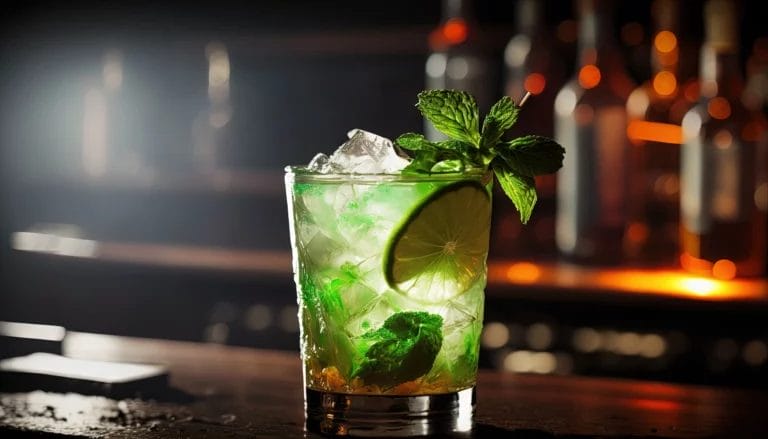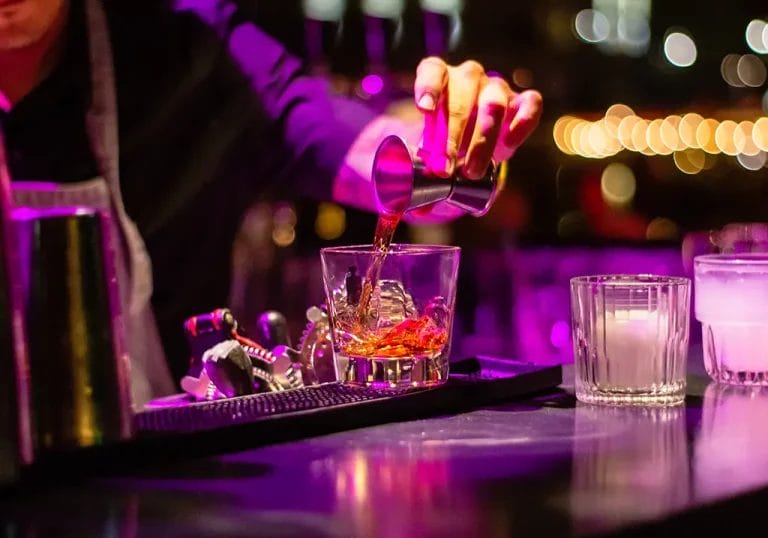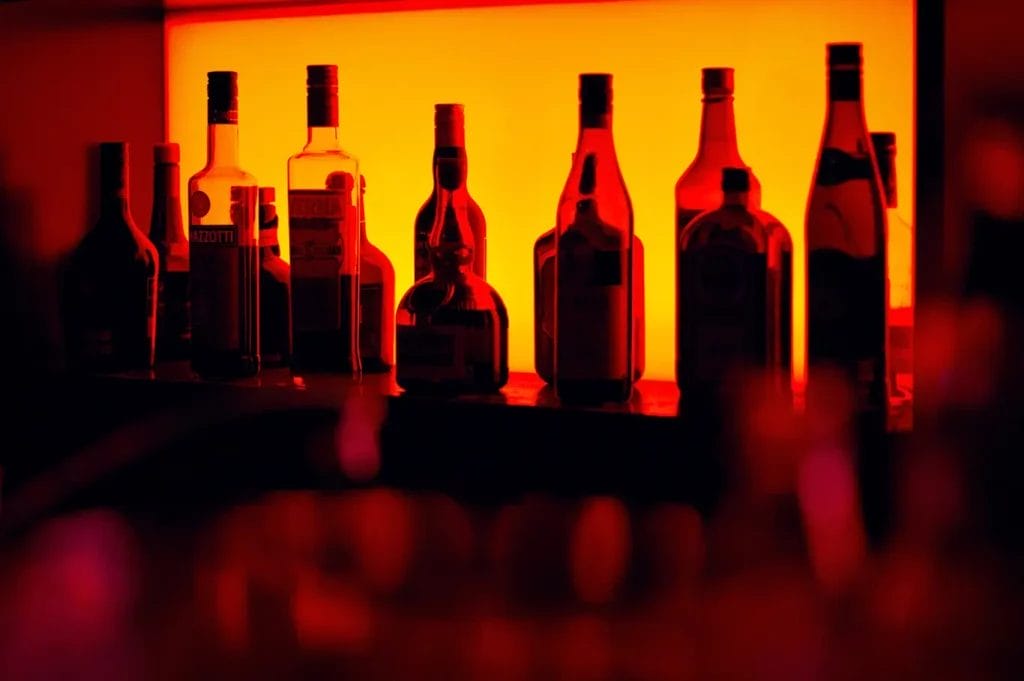Last Updated: 4/9/2025
You’ve been hired as a private bartender for an event. You have the mixology down to a science, but you may have forgotten one thing: bartender liability insurance.
If you’re wondering why you need liability insurance or have been told you need it but aren’t sure what that means, this guide answers the most common questions about this type of coverage. Learn how to get monthly bartender insurance online today.
What Is Insurance for Bartenders?
Bartender liability insurance is designed to protect you from paying out of pocket for the most common types of claims you face in this line of work. It combines two types of insurance coverage:
- General liability insurance: covers injuries or property damage you cause to other people while doing business, like a customer tripping over a box you left out at an event or spilling red wine on the white venue carpet. It also offers protection from product-related claims like food poisoning or unlabeled allergens in a drink that make a patron sick.
- Liquor liability insurance: Adds coverage for alcohol-related injuries or property damage caused by your patrons’ actions, such as an intoxicated patron driving home drunk and causing a car accident that injures another driver. It also covers you if you accidentally serve alcohol to a minor.
Every business, regardless of whether they serve alcohol, needs general liability insurance because they are all at risk of third-party bodily injury and property damage claims.
Plus, bartenders like you need liquor liability insurance because general liability does not cover alcohol-related claims. This is why bartender insurance from FLIP includes both general liability and liquor liability coverage.
Why Do Bartenders Need Insurance?
Every business is exposed to risks, and bartenders are no exception. Selling, serving, or providing alcoholic beverages exposes you to third-party bodily injury and property damage claims, as well as those related to alcohol.
Liquor liability claims can be particularly expensive, costing thousands or even millions of dollars.
If you live in a state with dram shop laws, you can be held legally liable for damages caused by anyone you served. For example, even if your customer is the one who drives under the influence and gets into a car accident, your state’s laws can hold you responsible for any medical bills or property damage they cause.
Even if you live in one of the eight states without dram shop laws, you can still be sued over these same incidents and forced to pay. With bartender liability insurance, you have a financial safety net in place to help cover all or some of these expenses.

What Should I Consider When Shopping for Bartending Insurance?
Looking for the perfect monthly bartending insurance policy can feel overwhelming, but it’s a lot easier if you know what to keep an eye out for. Let’s break down the most critical factors to be aware of when looking for coverage.
General and Liquor Liability Coverage
The best policy includes general and liquor liability insurance to sufficiently protect you from third-party claims, including those related to alcohol.
It’s common for these coverages to be sold separately, but getting a bartender policy that bundles both is the smartest move. To purchase liquor liability insurance separately, you need an active general liability policy with limits equal to or higher than the liquor policy.
Bartender insurance contains both coverages so you can focus on serving customers with peace of mind.
Policy Length
An annual policy is the best fit if you bartend throughout the year. Getting coverage for the whole year protects you from being uninsured at any given time, so you have protection from costly claims no matter when or where your gig is.
However, an event policy might be more your speed if you only need coverage for a specific occasion. An event policy offers short-term coverage over a set number of days instead of a year’s worth of coverage.
Additional Coverage Options
While every bartender needs general liability and liquor liability insurance, there are other coverage types you may need, depending on your risk factors.
This includes coverages like:
- Tools and equipment (inland marine): Can cover the cost of repairing or replacing stolen or damaged business equipment
- Professional liability: Designed to cover legal costs associated with your services, like a client suing you because you showed up late to their event
- Cyber liability: Helps mitigate or eliminate the costs associated with cybercrime claims, such as paying to restore lost or stolen data
- Assault and battery: Can cover the cost of medical bills or legal fees associated with threats of violence or fights caused by an intoxicated patron
Not every bartender is exposed to the same risks, so the ability to easily customize your insurance with additional coverages is critical.
Customer Service
If you have questions about your policy or need to file a claim, you don’t want to wait around for someone to speak to. Read online reviews that mention a company’s customer service to get a better idea of how good theirs is.
Why Monthly Bartender Insurance From FLIP?
Get affordable insurance for bartenders from Food Liability Insurance Program (FLIP) starting at $37.75 per month or $453 per year for an annual policy.
This includes general liability and liquor liability coverage to ensure protection against common claims, whether or not they involve alcohol.
With FLIP, you’ll also enjoy:
- Flexible payment options: Choose between paying a monthly premium or save by paying upfront for an annual policy
- Customizable coverage: Add additional coverages to personalize your policy like tools and equipment or assault and battery during checkout for an extra fee
- Stellar customer service: Get friendly, prompt assistance from our licensed, non-commissioned customer service representatives when you have a question about your policy
40,000+ food and beverage businesses trust FLIP to be there for them if something goes wrong. Join them and gain the coverage you need to pour with peace of mind!

FAQs About Bartender Coverage
Why Is Insurance for Bartenders So Expensive?
There are a few factors that can increase the cost of your coverage, including:
- Dram shop laws: States with dram shop laws grade your legal liability from 0 to 10. The higher your grade, the more legal liability you face, which causes your premium to go up.
- Revenue: Bartenders who make more money generally work more events and interact with more customers than those who don’t, which increases their liability risk.
- Additional coverages: If you need coverages other than general and liquor liability, that will increase your premium.
Liquor liability claims also tend to be expensive because they often involve car accidents, fights, and property damage. Insurance companies account for this when determining a policy’s starting price.
What’s the Difference Between Bartender Insurance and Liquor Liability Insurance?
Liquor liability insurance is one of two types of coverage that make up bartender insurance; the other is general liability. It is often sold on its own, but you cannot purchase a liquor policy without first having general liability insurance.
Think of general liability insurance as the foundation of your coverage and liquor liability as a necessary additional layer for anyone who sells and/or serves alcohol. FLIP makes it easy to get both in a bartender insurance policy, saving you time and hassle.
What Expenses Can Bartender Liability Insurance Cover?
A bartender insurance policy can cover a variety of costs stemming from general liability and liquor liability claims, including:
- Medical bills
- Attorney’s fees
- Settlements
- Repairs to damaged property
- Replacements for destroyed property
Without the proper coverage in place, you would need to pay for these expenses yourself.
How Can I Reduce My Risks as a Bartender?
Even the most prepared businesses still have to file claims, but there are a few mitigation strategies that can reduce the chance of a liability incident:
- Encourage designated drivers (DDs) by offering non-alcoholic beverages and snacks to all DDs, free of charge.
- Recognize signs of intoxication like slurred speech, aggressive behavior, lack of coordination, and bloodshot eyes. Refuse service to anyone who displays these characteristics.
- Always check IDs before you serve someone, and make it standard practice to card everyone, regardless of how old they look. Better safe than sorry!
- Speak with the event organizer or client you’re working for about prohibiting guests from bringing their own drinks into the venue. If customers bring outside drinks, you have no control over how much alcohol they consume.
- Have local taxi numbers readily available for guests to call a cab home and offer to schedule an Uber or Lyft ride for anyone who needs one.

Alex Hastings
Seattle-based copywriter and (WA) licensed insurance agent Alex Hastings leverages her experience as a lover of fast-casual food, baked goods, and iced oat milk lattes. She holds a B.A. in Creative Writing from Western Washington University. Before working at Veracity, she was a retail copywriter at Zulily and an English language teacher in South Korea. Alex is fully trained on FLIP insurance coverages and writes content that connects food and beverage business owners with the policies they need.
Seattle-based copywriter and (WA) licensed insurance agent Alex Hastings leverages her experience as a lover of fast-casual food, baked goods, and iced oat milk lattes. She holds a B.A. in Creative Writing from Western Washington University. Before working at Veracity, she was a retail copywriter at Zulily and an English language teacher in South Korea. Alex is fully trained on FLIP insurance coverages and writes content that connects food and beverage business owners with the policies they need.

